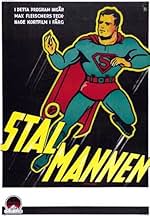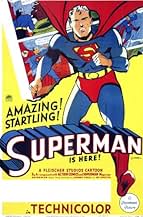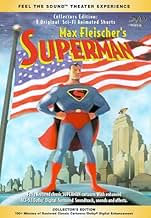O Homem de Aço luta contra um cientista louco que está destruindo Metrópolis com um canhão de energia.O Homem de Aço luta contra um cientista louco que está destruindo Metrópolis com um canhão de energia.O Homem de Aço luta contra um cientista louco que está destruindo Metrópolis com um canhão de energia.
- Direção
- Roteiristas
- Artistas
- Indicado a 1 Oscar
- 1 indicação no total
- Clark Kent
- (narração)
- (não creditado)
- …
- Lois Lane
- (narração)
- (não creditado)
- Perry White
- (narração)
- (não creditado)
- The Mad Scientist
- (narração)
- (não creditado)
- Narrator
- (narração)
- (não creditado)
Avaliações em destaque
The New York Times said of this cartoon " {this cartoon} is among the brothers' less successful efforts. The Fleischers show so little aptitude for -or interest in-realistic animation styles. Superman and Lois Lane are at their most wooden. So is the story's villain, a mad scientist. But the scientist's raven is wildly alive, like any real Fleischer creation, and the film sneaks in as many raven's-eye glimpses as possible. Heroic human figures have little to do with the grim, witty hallmarks of the Fleischers' imagination."
I must disagree with the Times' opinion. If one was to look at Superman comic strips from this point of time, one would see that the Superman of the comic books and the Superman of the cartoons, looks essentially the same. Yes, the raven is the most "cartoon" like character in the cartoon, but the film is still enjoyable, and is a snapshot of what cartoons were like right before the start of WWII.
A mad scientist turns his death ray on Metropolis to begin destroying bridges & buildings. Intrepid reporter Lois Lane crashes her plane directly in the madmans front yard. With Lois a prisoner & the death ray once again in operation, it looks like a job for SUPERMAN!
This was the first in a series of excellent cartoons Max Fleischer produced for Paramount Studio. They feature great animation and taut, fast-moving plots. Meant to be shown in movie theaters, they are miles ahead of their Saturday Morning counterparts.
Você sabia?
- CuriosidadesMax Fleischer and Dave Fleischer were reluctant to take this assignment because it would require much more realistic designs and animation than they usually used. They tried to discourage Paramount by stating they would need a budget of around $100,000 per short, four times the budget of an average Walt Disney cartoon, which then had the highest budgets in animation. To their shock, Paramount executives agreed to at least half the amount, which made the Superman series--in adjusted dollars--the biggest-budgeted animation series in film history.
- Citações
[first lines]
Voices: Up in the sky, look: It's a bird. It's a plane. It's Superman!
Narrator: [opening narration] In the endless reaches of the universe, there once existed a planet known as Krypton, a planet that burned like a green star in the distant heavens. There, civilization was far advanced and it brought forth a race of "supermen," whose mental and physical powers were developed to the absolute peak of human perfection. But there came a day when giant quakes threatened to destroy Krypton forever. One of the planet's leading scientists, sensing the approach of doom, placed his infant son in a small rocket ship and sent it hurtling in the direction of the Earth just as Krypton exploded. The rocket ship sped through star-studded space, landing safely on Earth with its precious burden: Krypton's sole survivor. A passing motorist found the uninjured child and took it to an orphanage. As the years went by and the child grew to maturity, he found himself possessed of amazing physical powers. Faster than a speeding bullet, more powerful than a locomotive, able to leap tall buildings in a single bound. The infant of Krypton is now the Man of Steel: Superman! To best be in a position to use his amazing powers in a never-ending battle for truth and justice, Superman has assumed the disguise of Clark Kent, mild-mannered reporter for a great metropolitan newspaper.
- Versões alternativasIn the scene in the editor's office, when Lois Lane runs off to "follow up her lead," Clark Kent originally asked Perry White, "Don't you think that's a dangerous mission for a girl?" In most current prints, the scene is cut so that the line now ends on the word "mission."
- ConexõesEdited into Fantastic Animation Festival (1977)
Principais escolhas
Detalhes
- Data de lançamento
- País de origem
- Central de atendimento oficial
- Idioma
- Também conhecido como
- Superman
- Empresa de produção
- Consulte mais créditos da empresa na IMDbPro
Bilheteria
- Orçamento
- US$ 50.000 (estimativa)
- Tempo de duração
- 10 min
- Proporção
- 1.37 : 1
























